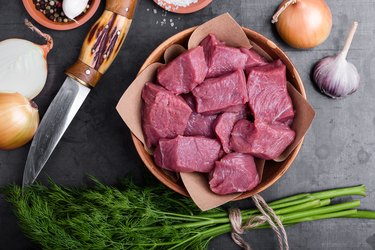Meat can go bad for a wide variety of reasons. Bacterial or fungal contamination, poor food hygiene, or simply keeping it at warm temperatures for too long can all lead to rotten meat. No matter what caused your meat to go bad, eating it will probably make you sick.
Even after cooking it, contaminated meat can make you ill. Certain bacteria produce toxins that cant be removed through heat.
Identifying Bad or Rancid Meat
Fresh meat typically has a faint aroma or none at all. In comparison, rancid meat smells strange. If the meat in your refrigerator smells sour, sulfurous, or like ammonia, it has gone bad.



As meat goes bad, it usually takes on grayish undertones. Bad meat is likely to have notable discolorations. Typically, green and gray-green tints or spots indicate bacterial growth.
Your meat’s texture can also indicate whether or not it has gone bad. Fresh meat should be firm and slightly moist. Your meat has probably been contaminated by some kind of microbe if it is slimy or sticky.
Not all microbes are dangerous. On the other hand, if your meat is tainted with harmful bacteria like salmonella, staphylococcus, clostridium, or E coli, you can become very sick from food poisoning. According to the Mayo Clinic, symptoms of food poisoning include stomach pain, nausea, vomiting, fever, diarrhea, and other gastrointestinal problems.



There is no guarantee that cooking and consuming spoiled pork, stale chicken, or any other bad meat will make you ill, though. Whether or not you fully cooked your food will also affect whether you get sick.
Many bacteria can be killed during the cooking process. For instance, you might not get sick if you made a long-cooked stew or soup with boiled meat.
However, heat isnt a guaranteed way to prevent food poisoning. This is because certain bacteria also release toxins, according to the Mayo Clinic. Even when you kill these bacteria by cooking them, their toxins will remain in the food and cause you to become sick.
Preventing Meat From Going Bad
According to the U. S. Food and Drug Administration, you should always keep meat and meat products in your refrigerator at 40 degrees Fahrenheit. This helps prevent spoilage. However, the duration of time meat can be kept at this temperature depends on the product. The FDA states that:
- Poultry can be kept in your refrigerator for two days.
- Your refrigerator can hold ground meat, including sausages, for two days.
- For one to two weeks, hot dogs can be stored in the refrigerator.
- Bacon can be kept in your refrigerator for 7 days.
- For up to five days, steaks can be kept in the refrigerator.
- You can keep offal (organ meat) in your refrigerator for 2 to 5 days.
Meat that is kept at 40 degrees Fahrenheit for any length of time will gradually begin to rot.
Freezing Meat and Meat Products
If you dont plan on eating your meat within the FDA-recommended time periods, you can keep your meat from going bad by freezing it at 0 degrees F. The USDA says that freezing food at this temperature inactivates bacteria and other microbes. Freezing food can even help destroy certain parasites.
According to the USDA, food can technically be stored at 0°F indefinitely. However, if you keep your meat in the freezer for too long, the quality will suffer. The FDA recommends the following limits:
- Poultry to be frozen for up to 12 months.
- Ground meat to be frozen for up to 4 months.
- Hot dogs to be frozen for up to2 months.
- Bacon to be frozen for up to 1 month.
- Steaks to be frozen for up to 12 months.
- Organ meat to be frozen for up to 4 months.
Whether its fresh or frozen, meat needs to be cooked thoroughly to kill all bacteria thats present in it. The U.S. Department of Health and Human Services says you should cook most meats to an internal temperature of 145 degrees F. Poultry needs to be cooked to a slightly higher internal temperature of 165 degrees F.
People Are Reading 1
FAQ
What should I do if I ate bad beef?
One way to assist your body in recovering from food poisoning is to simply rest. Take it easy until you are feeling better. Additionally, wait a few hours after the start of symptoms before eating or drinking. Try soft, bland foods like crackers and sports drinks once you do decide to eat and drink again.
How long does it take to get sick from bad beef?
The signs of food poisoning typically appear one to two days after consuming tainted food. They could also begin a few hours or weeks later.
What are the symptoms of bad beef?
A slimy surface film that you can see or feel on a piece of steak is a dead giveaway that the meat is bad or spoiled. It will be clear or yellowish in color and give the steak a glossier appearance than usual. Your fingers will also feel slippery or sticky when they touch it.
What happens if you cook spoiled beef?
The majority of bacteria are killed by cooking, so cooking spoiled food theoretically has the ability to make it safe to consume. However, cooked spoiled food is still not regarded as safe to eat.
